Dhruv Munjal gets up close and personal with Chandro and Prakashi Tomar, the inspiration for Saand Ki Aankh.
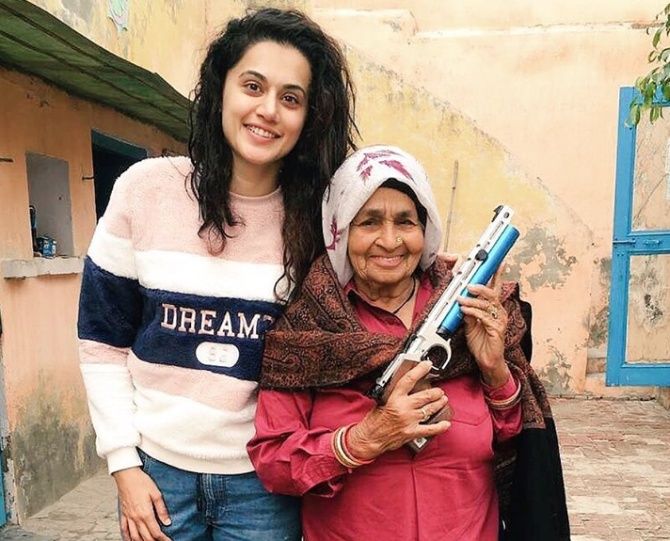
Chandro Tomar is tired, but it doesn't show. The past few days have been spent gallivanting around Mumbai -- hanging out with film stars, visiting the Gateway of India and sipping coconut water on Juhu beach.
"I joked with Salman Khan whether he was the same guy I had been watching on television all these years, but they edited that out," she complains gently about her appearance on the reality show Bigg Boss.
I am at her house in Johri village in Uttar Pradesh's Baghpat district, a breezy two-and-a-half-hour drive from Delhi.
The Tomar residence is typical of moderately affluent homes in the area: It has a huge gate that opens into a parking space that can hold a couple of cars, a cowshed in one corner and a vast courtyard perfect for soaking up the sun in the winter.
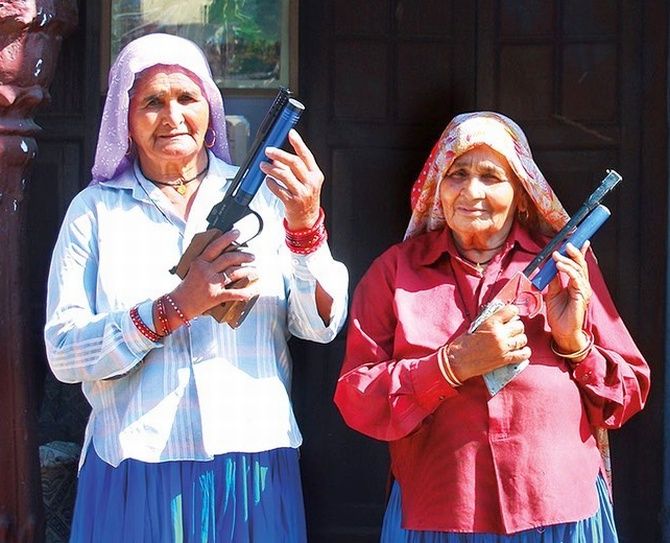
Chandro's room has lime green walls, floral-print sofas and bedsheets to match. Behind her is a watercolour portrait of her that she was gifted many years ago.
And across the room is the staggering medal haul she has amassed over 20 years -- good enough to put Michael Phelps in the shade. "I stopped counting a long time ago. You count and let me know," she laughs.
You can tell that Chandro, 88, has sat down for many such interactions, answered hundreds of similar questions and posed for the camera innumerable times.
Yet, her enthusiasm is undimmed. She smiles constantly, an undeniable zest for life sparkling in her eyes.
This conversation perhaps has an added edge of excitement because it comes so close to the release of Saand Ki Aankh (Bullseye), the Bhumi Pednekar-Taapsee Pannu starrer that opened to audiences on October 25.
The film captures the extraordinary story of how Chandro and her sister-in-law, Prakashi Tomar, took up shooting in their sixties and encouraged young girls to embrace the sport in their conservative village in western UP.
"The film is the result of over two decades of hard work. This is the greatest recognition," she says.
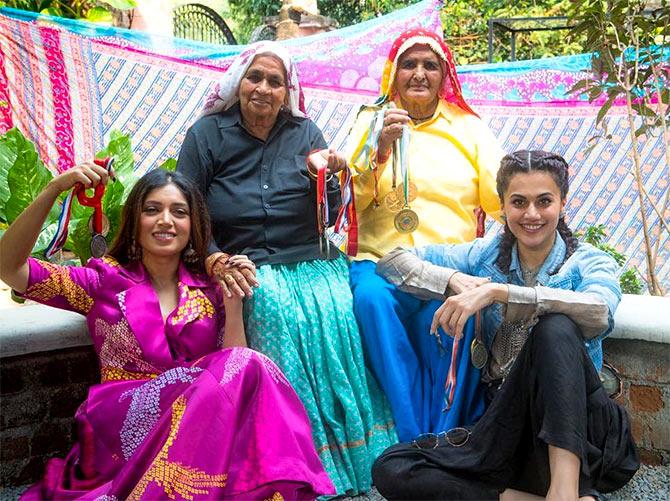
It started in 1998, when Rajpal Singh founded the Johri Rifle Association and set up a makeshift shooting range.
Chandro was only a spectator in those days, accompanying her young granddaughter Shefali to practice.
All that changed one day when Chandro, fed up of a terrified Shefali unable to wield the pistol with precision, decided to show her how it's done. Much to everyone's astonishment, she hit the bullseye. There was no looking back.
News of Chandro's feat soon reached Prakashi's daughter, Seema. And within months, Prakashi and Chandro became partners in crime, slaying the competition -- often men -- in the veteran category at shooting tournaments across the state. Inspired, Shefali and Seema are also now international shooters and feature in the film.
"The first time we went for a tournament, the Kargil War was on. People laughed that they were going to send us to fight in the war," recalls Prakashi, whose character in the film is played by Pannu.
I meet Prakashi at Seema's house in Noida. Much like Chandro, who is five years her senior, Prakashi is quite the effervescent antithesis of the stereotype of a grandmother.
Dressed in a black shirt, blue ghagra and pale orange headscarf, she welcomes me with a broad smile. She boasts that even at this age, she has perfect eyesight and that her knees haven't yet given way.
A walk in the fields every morning and yoga, she says, keep her going. She is very cool. So much so that she isn't remotely fazed at the monstrosity that are my ripped jeans (and by ripped, I mean all of my right knee exposed).
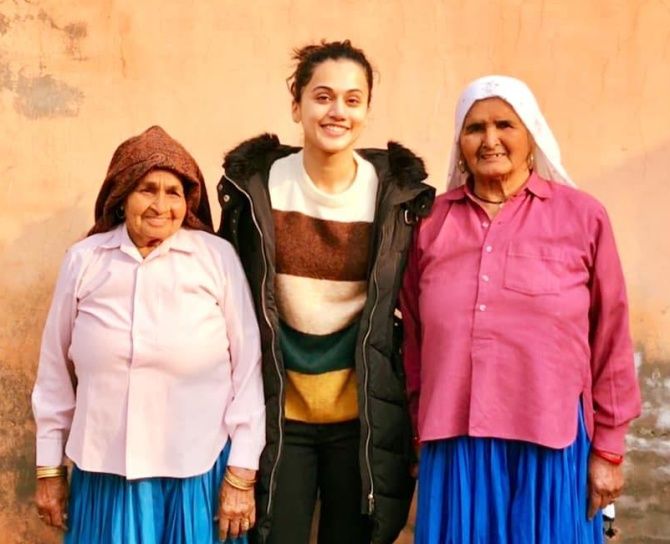
The patriarchal mindset prevalent in the village meant that their shooting adventures initially remained a secret.
Like all women in the village, Chandro and Prakashi performed household chores and ploughed the fields during the day. In the evening, they would sneak off to the range, learning how to load a gun, keeping their hand still and making a habit of hitting the bullseye.
Their secret was laid bare when the news of Prakashi beating seasoned male shooters to the gold medal at a state championship in Delhi appeared on an inside page of a local newspaper.
Seema shows me a clipping of the article, dated January 17, 2000: It has a picture of a sheepish Prakashi standing atop the podium, flanked by two balding old men.
There was uproar at home, but the children rallied behind their mothers. Instead of openly offering their support, the men finally decided to look the other way.
Chandro and Prakashi are now both retired, but their husbands never saw them in action despite all their accolades. Nor did they ever discuss shooting at home.
"For us, that was enough. In a way, that was them coming on board," says Prakashi. "That helped us gain the approval of others."
Not that they needed anyone's approval. Prakashi and Chandro were going from door to door persuading young girls to join the academy much before anyone knew they were such accomplished markswoman.
"Our motto is not only 'beti bachao, beti padhao (save the daughter, educate the daughter)', but also 'beti khilao (encourage the daughter to play)'," explains Chandro.
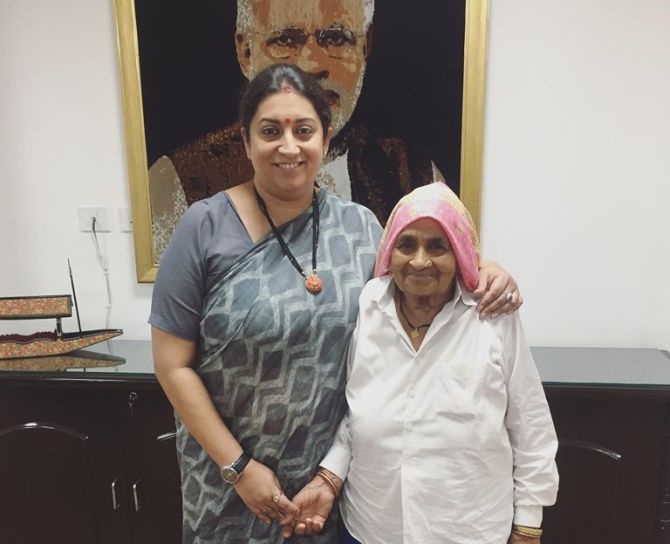
So powerful was their story that it was only a matter of time before a film-maker picked it up.
So, two years ago, when Seema received a call from Anurag Kashyap -- one of the film's producers -- she agreed instantly.
"What bigger medium to spread the message of women empowerment?" says Seema who won silver in the trap at the 2010 ISSF World Cup in Dorset (England) and is commissioned in the Indian Army.
A major part of the film was shot in Baghpat, with Pednekar and Pannu spending several days studying the dadis's mannerisms.
Pannu slept at Chandro's haveli for almost two months. "We used to have lunch together every day. Both of them are immensely grounded and a lot of fun," says Chandro.
Make-up on set was a bit of a palaver since Pannu, 31, and Pednekar, 30, were trying to look like women in their sixties.
Should someone older have played them? "I don't understand films, so I just chose to trust the makers. Both the actors have done a terrific job. No complaints," says Prakashi.
The octogenarians's success has helped expand a flourishing shooting culture in the district, especially among young women. As many as 300 of them have landed government jobs in the last 10 years on the back of their shooting ability.
Between them, the villages of Johri, Baraut and Binauli now have 20 shooting ranges. But the one where Chandro and Prakashi learnt the ropes is in a state of disrepair.
"The state government sent a coach and it soon became a money-making business. The fee wasn't very high -- Rs 700 to Rs 1,000 a month -- but the focus was no longer on the sport," says Chandro's younger son Vinod, regretfully.
The family is setting up a new shooting range across Prakashi's house -- with their own money. "We didn't get much from the film -- just Rs 5 lakh each -- but we'll do whatever we can for kids in the village," he adds.
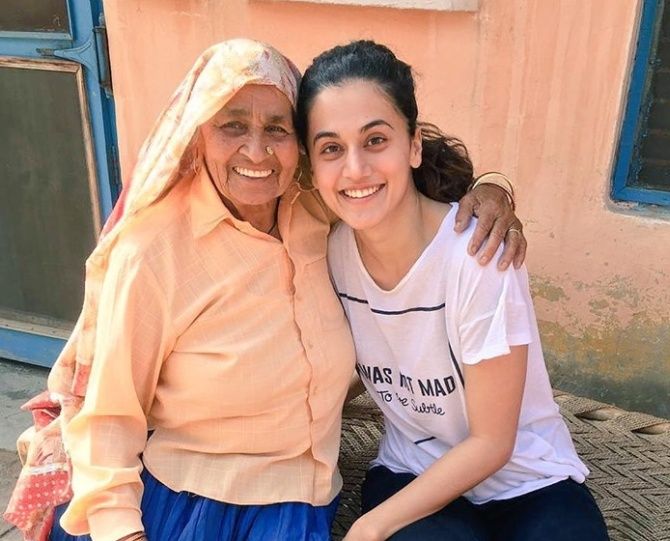
Despite enormous potential, investment in sport in these parts remains a challenge. To top it, shooting has always been a rich man's sport.
Barely a kilometre from Chandro's house, at the Aklavya Sport Shooting Club, a dangerously steep iron staircase leads to a range where budding shooters line up their targets, faces still with concentration. Since they cannot afford an air-conditioner, a large curtain is drawn to keep the wind out.
Fifteen-year-old Deepa (she uses only her first name), who competes in the 10m air pistol, tells me that girls are now allowed to roam around unaccompanied and travel for competitions in other cities.
There has been a shift in the mindset, she says. Shooting has opened a door to the world for them, adds Sudha Tomar, 23, a local resident. "I initially fought with my parents, but it's been worth it."
But the financial crunch means that many end up quitting the sport despite blossoming early on. "All we want is that established shooters such as Seema and Shefali take our message to the administrators," says Hassan Malik, one of the coaches at Aklavya.
The issues here range from substandard shooting equipment to high tournament registration fees. "How do you expect to produce medalists when the UP government offers no rewards to athletes who do well in national competitions?" demands Bittu Khan, who runs a shooting academy in Binauli.
The Sports Authority of India gives out scholarships here every year, but it is insufficient given the large number of kids keen on the discipline.
Demolishing patriarchy entirely also remains an elusive target. While she has taught many in the village, Chandro's own daughter-in-law has never been to a shooting range.
"She never had much interest," counters Chandro as her daughter-in-law serves us tea, head veiled, eyes trained on the floor.
Some women in the village are still not allowed to venture out after dusk or wear jeans and have no access to social media. "There has been change, but you can't make everyone happy. There will always be some resistance to change," says Vinod, who is now readying to take Chandro to an event at a local girls's college where she is the chief guest.
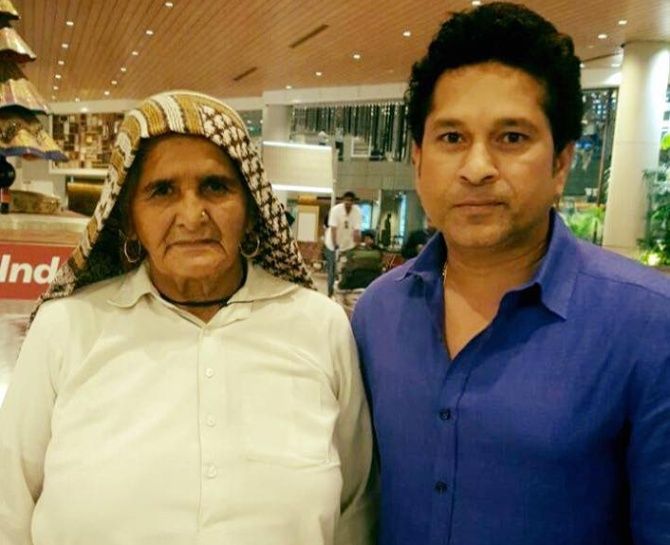
Chandro and Prakashi often accept invitations to such events, but seldom attend them together. Their rivalry over the years has taken the shape of an intriguing subplot driven by competitiveness.
Though theirs is essentially the same family, you have to go through different members to meet them. They don't spend much time together either.
Both, however, maintain that they have lived their lives as sisters, with no room for animosity. "Hum dono ne ek katori mein roti khaayi hai (We've eaten off the same plate)," says Chandro.
At the college, Chandro dazzles the small audience with her eloquence -- and stamina.
She repeats her favourite catchphrase of "karenge to banege, darenge to marenge (nothing ventured, nothing gained)" a couple of times, as the girls applaud. "Don't you worry, I'll coach you."
Chandro and Prakashi have never owned a pistol. In the first few years, they made do with the ones available at the club. Later, Congress leader Rahul Gandhi sent them a pair; these continue to be used by young shooters at the club.
Back home, Chandro hands me a dummy pistol and teaches me how to gently pull the trigger to hit the bullseye.
I try, but botch it up. Unlike my feeble attempt, she will be hoping that Saand Ki Aankh comes out all guns blazing.












